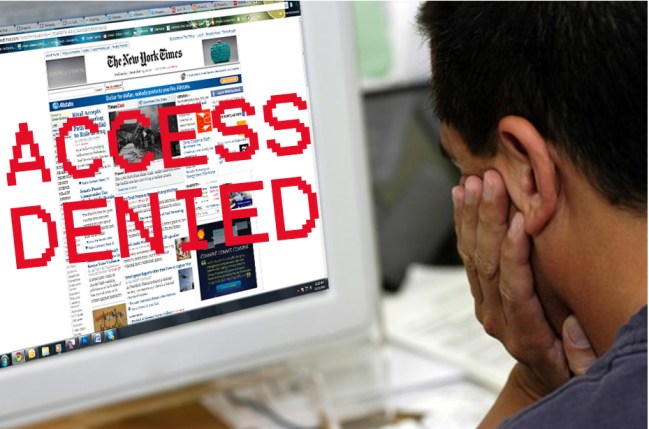 Air Force personnel are being denied access to all websites that published the recently leaked classified cables. The Wall Street Journal is reporting that upon attempting to visit sites including The New York Times, The Guardian, or Le Monde, Air Force employees instead see a page reading “ACCESS DENIED. Internet Usage if Logged & Monitored.” It also informs users that visiting these sites on military computers is a punishable offense.
Air Force personnel are being denied access to all websites that published the recently leaked classified cables. The Wall Street Journal is reporting that upon attempting to visit sites including The New York Times, The Guardian, or Le Monde, Air Force employees instead see a page reading “ACCESS DENIED. Internet Usage if Logged & Monitored.” It also informs users that visiting these sites on military computers is a punishable offense.
Over 25 sites are on this list, but Air Force Space Command spokeswoman Major Toni Tones would not divulge what exactly is being blocked. Officials are, however, free to view any site they want on personal computers, and according to a screenshot the WSJ reviewed, if information on one of the blocked sites is “essential to a person’s job,” they will be allowed access.
The Air Force is, thus far, the only military branch to enforce this type of ban against the WikiLeaks material. The Secretary of Defense has also only advised against visiting any site publishing the material, but made no mandates. At the same time, earlier this month the White House reminded state employees and contractors without explicit permissions are forbidden from viewing the cables, at work or at home. How this will be enforced is still anybody’s guess, but officials are serious enough about it to require those who accidentally saw the WikiLeaks recent leak to contact their US security officials at work.
A NYT spokeswoman expressed regret concerning the ban, and some have questioned whether blocking access to a major US news publication is in the best interest of Air Force personnel. Steven Aftergood of the Federation of American Scientists told the NYT that this is “a self-defeating policy that will leave government employees less informed than they ought to be.”
The US government has largely taken a hard stand against WikiLeaks latest activity. Officials have actively pressured sites to deny hosting WikiLeaks, and one federal employee even warned college students that discussing the issue on social networking sites could be detrimental to their career aspirations. The possibility of former Army specialist Bradley Manning being involved in the leak has heightened security within the federal community, and an active investigation regarding the leaks is ongoing. A House Judiciary Committee will meet this Thursday.


